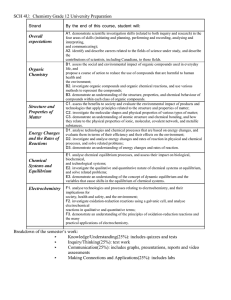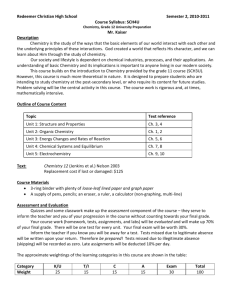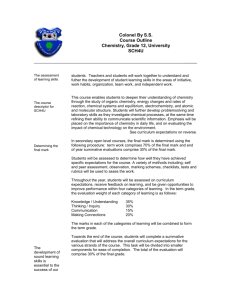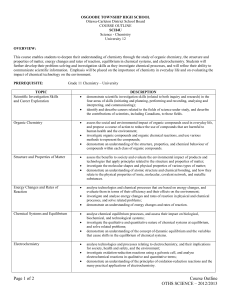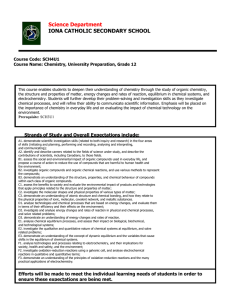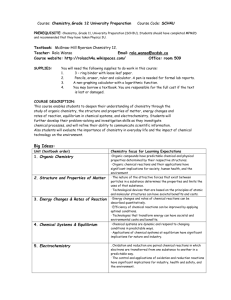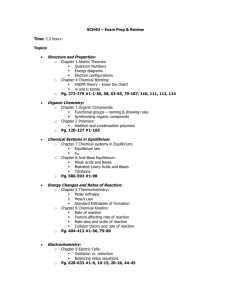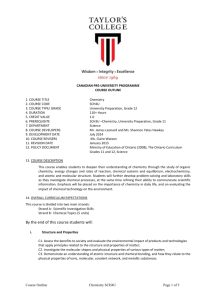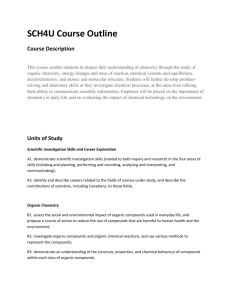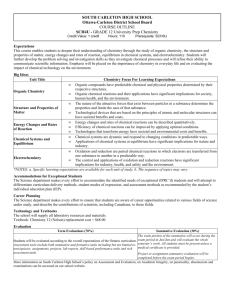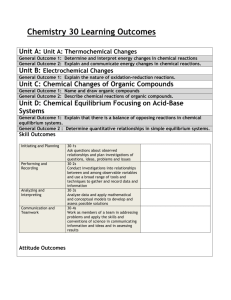Grade Twelve University Preparation SCH4U Course of Study
advertisement
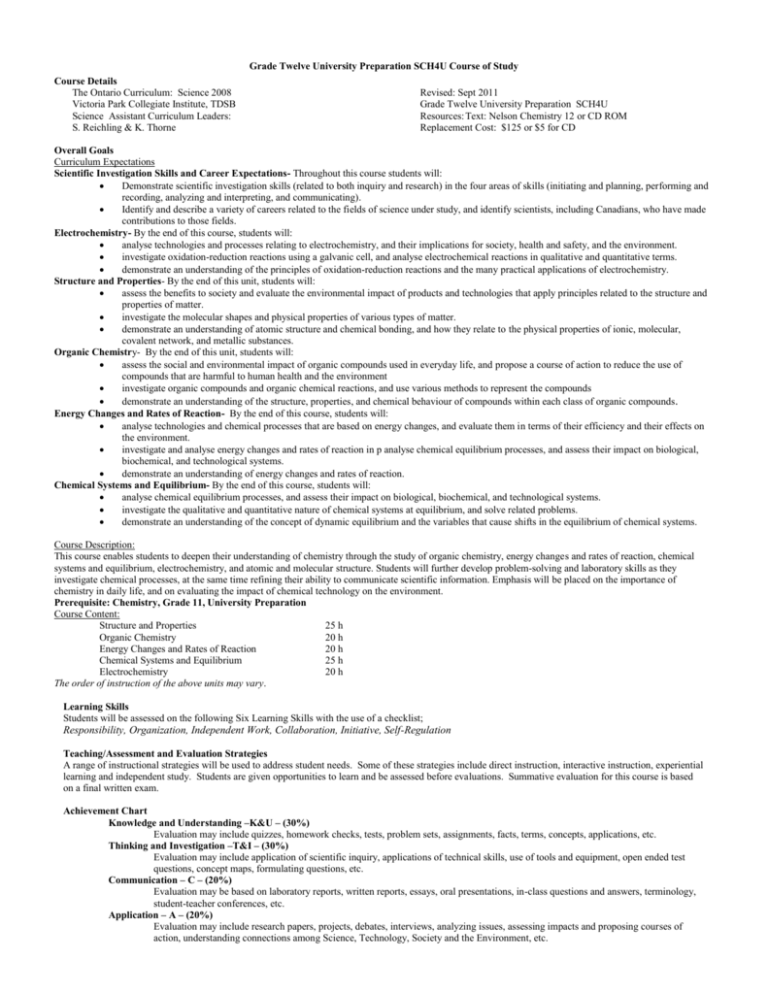
Grade Twelve University Preparation SCH4U Course of Study Course Details The Ontario Curriculum: Science 2008 Victoria Park Collegiate Institute, TDSB Science Assistant Curriculum Leaders: S. Reichling & K. Thorne Revised: Sept 2011 Grade Twelve University Preparation SCH4U Resources: Text: Nelson Chemistry 12 or CD ROM Replacement Cost: $125 or $5 for CD Overall Goals Curriculum Expectations Scientific Investigation Skills and Career Expectations- Throughout this course students will: Demonstrate scientific investigation skills (related to both inquiry and research) in the four areas of skills (initiating and planning, performing and recording, analyzing and interpreting, and communicating). Identify and describe a variety of careers related to the fields of science under study, and identify scientists, including Canadians, who have made contributions to those fields. Electrochemistry- By the end of this course, students will: analyse technologies and processes relating to electrochemistry, and their implications for society, health and safety, and the environment. investigate oxidation-reduction reactions using a galvanic cell, and analyse electrochemical reactions in qualitative and quantitative terms. demonstrate an understanding of the principles of oxidation-reduction reactions and the many practical applications of electrochemistry. Structure and Properties- By the end of this unit, students will: assess the benefits to society and evaluate the environmental impact of products and technologies that apply principles related to the structure and properties of matter. investigate the molecular shapes and physical properties of various types of matter. demonstrate an understanding of atomic structure and chemical bonding, and how they relate to the physical properties of ionic, molecular, covalent network, and metallic substances. Organic Chemistry- By the end of this unit, students will: assess the social and environmental impact of organic compounds used in everyday life, and propose a course of action to reduce the use of compounds that are harmful to human health and the environment investigate organic compounds and organic chemical reactions, and use various methods to represent the compounds demonstrate an understanding of the structure, properties, and chemical behaviour of compounds within each class of organic compounds. Energy Changes and Rates of Reaction- By the end of this course, students will: analyse technologies and chemical processes that are based on energy changes, and evaluate them in terms of their efficiency and their effects on the environment. investigate and analyse energy changes and rates of reaction in p analyse chemical equilibrium processes, and assess their impact on biological, biochemical, and technological systems. demonstrate an understanding of energy changes and rates of reaction. Chemical Systems and Equilibrium- By the end of this course, students will: analyse chemical equilibrium processes, and assess their impact on biological, biochemical, and technological systems. investigate the qualitative and quantitative nature of chemical systems at equilibrium, and solve related problems. demonstrate an understanding of the concept of dynamic equilibrium and the variables that cause shifts in the equilibrium of chemical systems. Course Description: This course enables students to deepen their understanding of chemistry through the study of organic chemistry, energy changes and rates of reaction, chemical systems and equilibrium, electrochemistry, and atomic and molecular structure. Students will further develop problem-solving and laboratory skills as they investigate chemical processes, at the same time refining their ability to communicate scientific information. Emphasis will be placed on the importance of chemistry in daily life, and on evaluating the impact of chemical technology on the environment. Prerequisite: Chemistry, Grade 11, University Preparation Course Content: Structure and Properties 25 h Organic Chemistry 20 h Energy Changes and Rates of Reaction 20 h Chemical Systems and Equilibrium 25 h Electrochemistry 20 h The order of instruction of the above units may vary. Learning Skills Students will be assessed on the following Six Learning Skills with the use of a checklist; Responsibility, Organization, Independent Work, Collaboration, Initiative, Self-Regulation Teaching/Assessment and Evaluation Strategies A range of instructional strategies will be used to address student needs. Some of these strategies include direct instruction, interactive instruction, experiential learning and independent study. Students are given opportunities to learn and be assessed before evaluations. Summative evaluation for this course is based on a final written exam. Achievement Chart Knowledge and Understanding –K&U – (30%) Evaluation may include quizzes, homework checks, tests, problem sets, assignments, facts, terms, concepts, applications, etc. Thinking and Investigation –T&I – (30%) Evaluation may include application of scientific inquiry, applications of technical skills, use of tools and equipment, open ended test questions, concept maps, formulating questions, etc. Communication – C – (20%) Evaluation may be based on laboratory reports, written reports, essays, oral presentations, in-class questions and answers, terminology, student-teacher conferences, etc. Application – A – (20%) Evaluation may include research papers, projects, debates, interviews, analyzing issues, assessing impacts and proposing courses of action, understanding connections among Science, Technology, Society and the Environment, etc. 70% Grade on Course Work* Electrochemistry Task Redox Reactions Quiz Electrochemical Cell Experiment Electrochemistry Application Assignment Unit Test Structure and Properties Task Atomic Theories and Properties Quiz Bonding Investigation Specialized Materials/ Analytical Technologies Assignment Unit Test Organic Chemistry Task Organic Nomenclature Quiz Effect of Organic Compounds Assignment Organic Reactions Investigation Unit Test Energy Changes and Rates of Reaction Task Thermochemistry Quiz Hess' Law Assignment Rates Experiment Unit Test Chemical Systems and Equilibrium Task Equilibrium Quiz Equilibrium Lab Acid/Base Titration Unit Test K&U X X X K&U X X X K&U X X K&U X X K&U X X Achievement Chart Focus T&I C X X X X X X Achievement Chart Focus T&I C X X X X X X Achievement Chart Focus T&I C X X X X X X X Achievement Chart Focus T&I C X X X X X X Achievement Chart Focus T&I C X X X X X X X A X A X X A X X A X A X X * Note: The above evaluations are subject to minor changes. 30% Grade Based on Course-Culminating Activities All students will write one or more evaluations at the end of the course. These evaluations could include laboratory assessments, research projects/presentations and examinations. The Research Process: For every research-based assignment, students will be expected to use the TDSB student research guide, Research @ Your Library with the 4 stage model of the research process incorporated into these assignments either in part or in whole. Students will receive instruction and be assessed/ evaluated on various aspects of the research process by either their teacher or one of the teacher-librarians. These lessons may include, but are not limited to the development of research questions, note-taking, adherence to a specific documentation style, facility with a variety of resources, etc. Accommodations Accommodations refer to the teaching strategies, supports, and/or services that are required in order for a student to access the curriculum and demonstrate learning. Students who have an IEP are entitled to the accommodations specified in their plans. Term Grades for Provincial Reports throughout the Year The grade for each term/reporting period is based on the evaluations that have been conducted to that point in the course, and will be preliminary and tentative. They will be based on the most consistent level of achievement to that time, but some of the overall expectations, strands, end units, will not have been addressed. The students’ grades may change when all work has been evaluated at the end of the course. Midterm reports will be sent home with the students approximately half way through the semester. First of all … KNOW that we want you to succeed. The science office is in room 221. You are encouraged to make an appointment with your teacher if you would like extra help, or if you wish to see/discuss your marks. Do not hesitate to ask for help. Parents/guardians may contact the teacher at any time with comments and/or concerns at 416 – 395 – 3310 ext. 20095. Parents/guardians may also schedule an interview during Parent/Teacher interview time. The teacher will contact parents/guardians as necessary.
